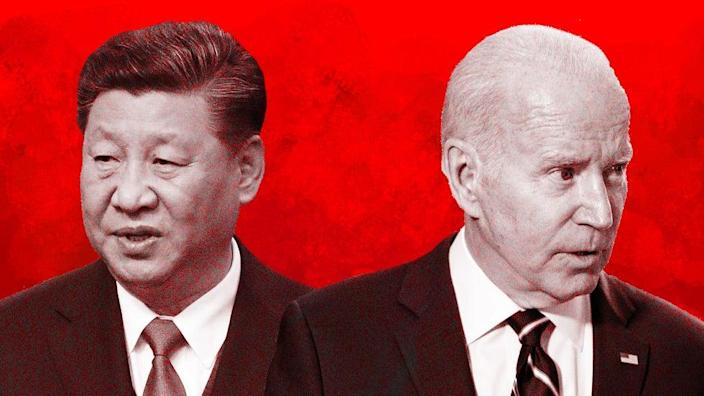
It’s Friday, welcome to Overnight Defense & National Security, your nightly guide to the latest developments at the Pentagon, on Capitol Hill and beyond. Subscribe here.
President Biden warned Chinese President Xi Jinping that Beijing would face consequences if it provided “material support” to Russia amid its invasion of Ukraine.
We’ll recap the call, and dive into the Department of Homeland Security watchdog’s rare move on a detention facility in New Mexico.
For The Hill, I’m Jordan Williams. Write me with tips at jwilliams@thehill.com.
Let’s get to it.
Biden to China’s Xi: No ‘material support’ for Russia
President Biden warned Chinese President Xi Jinping that Beijing would face consequences if it provided “material support” to Russia as its invasion of Ukraine rages on.
The nearly two-hour secure video call on Friday came as Biden administration officials publicly warn that Beijing would face consequences if it were to help Russia, which is believed to have asked Beijing for military support.
Beijing, though it has deepened relations with Russia in recent years, has sought to portray itself as a neutral party.
What happened in the meeting? In a readout of the call, the White House said Biden “detailed our efforts to prevent and then respond to the invasion, including by imposing costs on Russia.”
“He described the implications and consequences if China provides material support to Russia as it conducts brutal attacks against Ukrainian cities and civilians,” the readout continued.
A readout from China’s Ministry of Foreign Affairs, however, said Xi told Biden “that China does not want to see the situation in Ukraine to come to this.” Xi also affirmed support for peace negotiations between Russia and Ukraine, according to the readout, which did not condemn Russia’s actions in Ukraine.
“All sides need to jointly support Russia and Ukraine in having dialogue and negotiation that will produce results and lead to peace,” the readout continued. “The US and NATO should also have dialogue with Russia to address the crux of the Ukraine crisis and ease the security concerns of both Russia and Ukraine.”
Both readouts noted that the two leaders told their teams to follow up on the conversation in the days ahead.
The root of concerns: The call comes after reports surfaced earlier this week that Russia was seeking military assistance from China as it continues its invasion of Ukraine.
Moscow launched the invasion three weeks ago, and has escalated attacks as officials and experts say the invasion hadn’t moved as quickly as the Kremlin hoped.
National security adviser Jake Sullivan met with China’s top diplomat, Yang Jiechi, on Monday. During the meeting, Sullivan warned Beijing against helping Russia.
Secretary of State Antony Blinken told reporters on Thursday that China would “bear responsibility for any actions it takes to support Russia’s aggression and we will not hesitate to impose costs.”
ELEPHANT IN THE ROOM
Ukraine was not the only focus of Biden’s call with Xi on Friday.
According to the White House readout, Biden reiterated that the U.S. hasn’t changed its policy on Taiwan and “emphasized that the United States continues to oppose any unilateral changes to the status quo.”
Russia’s aggressions toward Ukraine have sparked concerns that China may try to invade or lay claim to Taiwan, which it views as its own territory.
Under the U.S.’s “One China” policy, Washington doesn’t recognize Taiwan as a separate state from China. But under the Taiwan Relations Act of 1979, the U.S. is committed to providing Taiwan with arms for its defense.
DHS wants detainees out of New Mexico facility
The Department of Homeland Security’s (DHS) watchdog took the rare step of asking for immediate removal of detainees from a New Mexico facility, citing alarming conditions seen during an unannounced visit.
DHS’s Office of Inspector General on Friday directed U.S. Immigration and Customs Enforcement (ICE) to remove detainees from the Torrance County Detention Facility in Estancia, N.M., citing “safety risks and unsanitary living conditions” for the 176 people detained there at the time of the inspection.
How bad was it? “During our inspection, we found such egregious conditions in the facility that we are issuing this management alert to notify ICE. We have determined that ICE must take immediate steps to address the critical facility staffing shortages and unsanitary living conditions that have led to health and safety risks for detainees at Torrance,” the OIG wrote in its report.
The report says critical levels of understaffing at the facility represent a security risk, while the prevalence of mold and other plumbing issues present health risks.
“There’s no way detainees should be housed here,” an OIG official said during the visit.
ABOUT TORRANCE
The Torrance facility is managed by CoreCivic, a private correctional company, which has had trouble recruiting staff to work at the facility.
At the time of the inspection, the facility was at 54 percent of required staffing, with the majority of staffing vacancies in the area of security, preventing the facility “from meeting contractual requirements that ensure detainees reside in a safe, secure, and humane environment.”
While required to have a minimum of 245 staff, Torrance had just 133 full-time employees.
ICE pushes back: ICE has not committed to removing detainees from the facility and instead largely pushed back on the report, including the inspector’s remark that detainees should not be housed there and claiming inspectors did not wait long enough for the hot water to arrive – both of which were refuted by OIG.
“During that walkthrough, OIG inspectors identified facility conditions that necessitated prompt facility action and provided, in real time, the information to the Torrance management staff who were accompanying the inspectors,” they wrote.
The report also points to ICE documentation of issues within the facility, digging up an agency contract discrepancy report from earlier this month.
Russia may lean into nuclear threat
The U.S. believes that Russia may lean into using its nuclear threat to project its strength as its invasion of Ukraine drags on, according to an assessment from the Defense Intelligence Agency.
Lt. Gen. Scott Berrier detailed the assessment in a report on worldwide threats submitted to the House Armed Services subcommittee on Intelligence and Special Operations submitted on Thursday.
The report itself, which was based on information available as of Tuesday, comes as the U.S. warned that Russia was growing more desperate as its advance into Ukraine hasn’t been moving as quickly as expected.
Why use the nuclear threat? Essentially, Berrier says that the prolonged advanced has taken a toll on its conventional forces and manpower, and sanctions imposed by the West will limit its ability to produce precision-guided munitions.
“As this war and its consequences slowly weaken Russian convention strength, Russia likely will increasingly rely on its nuclear deterrent to signal the West and project strength to its internal and external audiences,” Berrier wrote.
Quick flashback: Debate on how Russian President Vladimir Putin would use nuclear weapons have ramped up Russian President Vladimir Putin ordered his deterrence forces on “special combat duty” in late February
At the time, he blamed his decision on the West making aggressive statements about Russia.
In the report, Berrier said the order and other comments from Moscow touting its nuclear arsenal “are likely intended to intimidate.”
He said the comments reflect Russia’s view that the threat of nuclear weapons could either compel an adversary to negotiate an end to the conflict on terms favorable to Moscow or deter other parties from entering the war progress on conventional forces appear to have either reversed or stalled.
Intentions beyond Ukraine: Berrier writes that Russia is “determined to restore a sphere of influence over Ukraine and the other states of the former Soviet Union which is a key driver for Russian military aggression against Ukraine.”
Therefore, despite the unexpected resistance it’s received from Ukraine, Moscow “appears determined to press forward,” he said, noting the indiscriminate attacks destroying cities and increasing civilian deaths.
“The Kremlin likely calculates that a victory over Ukraine will compel most of the Soviet successor states to align themselves more closely with Moscow, but a military setback for Russia or a lengthy drawn-out campaign in Ukraine probably will have the opposite effect,” he continued.
ON TAP FOR MONDAY
WHAT WE’RE READING
That’s it for today! Check out The Hill’s defense and national security pages for the latest coverage. See you Monday!




